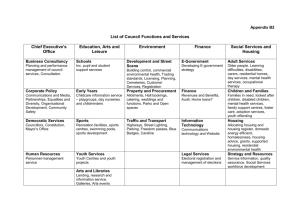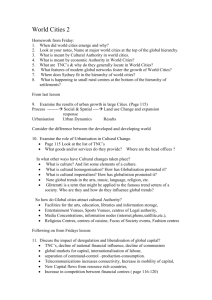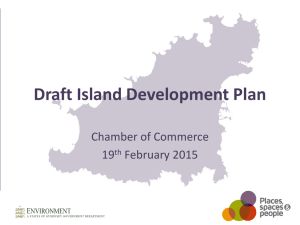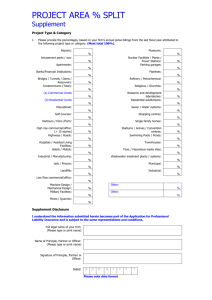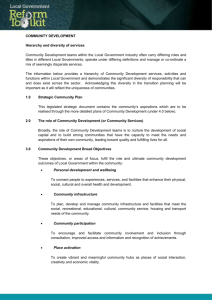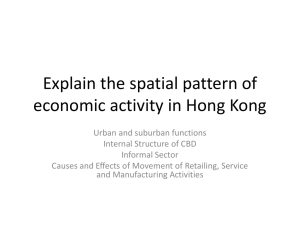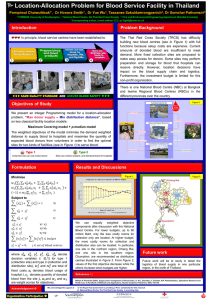Option-4World-Cities-no
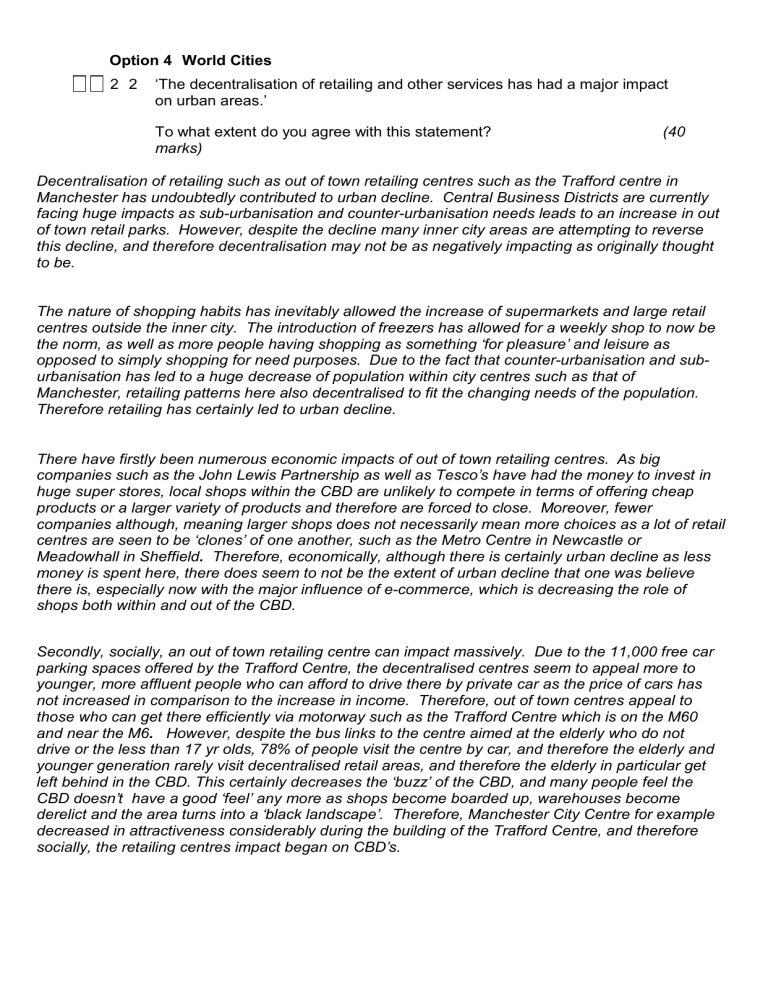
Option 4 World Cities
2 2 ‘The decentralisation of retailing and other services has had a major impact on urban areas.
’
To what extent do you agree with this statement? marks)
(40
Decentralisation of retailing such as out of town retailing centres such as the Trafford centre in
Manchester has undoubtedly contributed to urban decline. Central Business Districts are currently facing huge impacts as sub-urbanisation and counter-urbanisation needs leads to an increase in out of town retail parks. However, despite the decline many inner city areas are attempting to reverse this decline, and therefore decentralisation may not be as negatively impacting as originally thought to be.
The nature of shopping habits has inevitably allowed the increase of supermarkets and large retail centres outside the inner city. The introduction of freezers has allowed for a weekly shop to now be the norm, as well as more people having shopping as something
‘for pleasure’ and leisure as opposed to simply shopping for need purposes. Due to the fact that counter-urbanisation and sub- urbanisation has led to a huge decrease of population within city centres such as that of
Manchester, retailing patterns here also decentralised to fit the changing needs of the population.
Therefore retailing has certainly led to urban decline.
There have firstly been numerous economic impacts of out of town retailing centres. As big companies such as the John Lewis Partnership as well as Tesco
’s have had the money to invest in huge super stores, local shops within the CBD are unlikely to compete in terms of offering cheap products or a larger variety of products and therefore are forced to close. Moreover, fewer companies although, meaning larger shops does not necessarily mean more choices as a lot of retail centres are seen to be ‘clones’ of one another, such as the Metro Centre in Newcastle or
Meadowhall in Sheffield. Therefore, economically, although there is certainly urban decline as less money is spent here, there does seem to not be the extent of urban decline that one was believe there is, especially now with the major influence of e-commerce, which is decreasing the role of shops both within and out of the CBD.
Secondly, socially, an out of town retailing centre can impact massively. Due to the 11,000 free car parking spaces offered by the Trafford Centre, the decentralised centres seem to appeal more to younger, more affluent people who can afford to drive there by private car as the price of cars has not increased in comparison to the increase in income. Therefore, out of town centres appeal to those who can get there efficiently via motorway such as the Trafford Centre which is on the M60 and near the M6. However, despite the bus links to the centre aimed at the elderly who do not drive or the less than 17 yr olds, 78% of people visit the centre by car, and therefore the elderly and younger generation rarely visit decentralised retail areas, and therefore the elderly in particular get left behind in the CBD. This certainly decreases the ‘buzz’ of the CBD, and many people feel the
CBD doesn ’t have a good ‘feel’ any more as shops become boarded up, warehouses become derelict and the area turns into a ‘black landscape’. Therefore, Manchester City Centre for example decreased in attractiveness considerably during the building of the Trafford Centre, and therefore socially, the retailing centres impact began on CBD ’s.
In contrast, the Trafford Centre is hugely attractive socially to visitors with a 20-pin bowling alley and
20 screen cinema complex, as well as a ‘Laser Quest’ arena, the Trafford are certainly offering more services than purely retail services to the customers. Due to huge amounts of sub-urbanisation and counter urbanisation the centres appeal to all those who don ’t want to face the traffic in an urban centre, and the retail centres have a huge sphere of influence, Manchester Trafford has approximately 5 million people within a 45 minute radius as well as 120 buses travelling to and from the centre every hour. Therefore, the centre is hugely attractive to affluent people. However, it is not all bad news for urban centres; an urban renewal is rife at the moment to appeal and attract people once again as Kaben City in Germany have been successful at. Areas such as these have increased the services within their CBD such as increasing the amount of banks, travel agents and post offices within the area, as even as developing flagship projects such as increasing the amount of museums in the area alongside, putting on more ‘farmers markets’ and fetes or fairs to attract people back into the urban centre. Moreover, Tesco
’s has become ‘Tesco Express’ in an urban centre. For example Central Manchester Development Corporation (CMDC) has attempted to improve the southern area of Manchester by developing 3,000 new luxury apartments as well as introducing the GMEX centre for science. Therefore, socially although the decentralisation of retail is negatively impacting on an urban area, CBD ’s are attempting to counteract this.
Furthermore, the environmental impacts of decentralisation of retail are phenomenal. The huge increase of traffic around the M60 near the traffic centre is said to have increased by 30% over the past decade and pollution is said to have increased rapidly. Moreover, the area is at threat at becoming an ‘urban heat island’ as cars and the buildings itself is adding to an increase of temperature around the retailing centre. Despite
‘Manchester Metroline’ a mass transit train system improving the area and decreasing the amount of cars on the road by 5.3 million annually, there is still such a huge amount of traffic and pollution increase around the centre, which is a similar problem for the Metrocentre, near Newcastle., although the environmental problems may be improved in the urban centres due to less cars and traffic present, it is counter balanced by the negative impacts of the retailing centre. Moreover, the use of air conditioning and electricity for CCTV in the retail centres also negatively impacts on the environment, certainly adding to climate change.Therefore, urban areas may be positively impacted environmentally by retail centres, however this is not the case for the located area of the retail centre.
Finally, huge political problems are further caused by retail centres being removed from inner cities.
CBDs become less attractive and areas of ‘decay’ come about where dirty, derelict buildings are vandalised and graffiti is common. The lack of community feel as a result of urban decline means that the turnout for elections in inner cities is the lowest ever, as we saw at the last election, turnout in Manchester was less than 20%. Moreover, extreme parties such as the BNP are voted for as people want rapid change and councils begin to demolish properties to meet governmental quotas also means that urban centres are having political problems due to retailing being decentralised.
Despite attempts to reverse the decline by adding free space and building luxury apartments as we can see in Kaben city in Germany, it is true that urban centres are having huge negative political impacts as a result of decentralisation of retail.
Overall, the decentralisation of retail has impacted massively on urban centres, particularly economically and politically as even attempts of urban renewal cannot overcome deep under-lying issues. However, attempts have been successful at reversing the decline in urban centres such as the work of the CMDC as the Trafford Centre was built, and therefore although it is irrevocable that decentralisation does have a huge impact on urban centres, the increase of e-commerce as well as the renewal of urban centres means that it is not yet the end for inner city areas.
